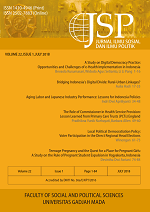Kodifikasi dan Efektivitas Kebijakan Fiskal untuk Menurunkan Emisi Gas Rumah Kaca pada Industri Semen, Baja dan Pulp
https://doi.org/10.22146/jsp.13040
Joko Tri Haryanto
(1*) , Berly Martawardaya
(2)
(1)
(2)
(*) Corresponding Author
Abstract
Industrial activity is known as one of the major contributors of greenhouse gas emissions (GHG). Sources of GHG emissions from the industrial sector include energy inputinput, the inputinput of non-energy, industrial processes and industrial waste. Thus, the industrial sector, listed as one of the important sectors in the National Action Plan (NAP) Reduction of GHG emissions. Implementation of mitigation actions in the industrial sector clearly requires appropriate regulatory framework. The right combination of policy and fiscal instruments needed to encourage industry players become actively involved in the national effort to reduce GHG emissions in Indonesia. The problem, the need for coordination regulations related efforts to reduce GHG emissions in the industrial sector of each Ministry / Institutions (K / L) are associated in particular Ministry of Finance Regulation (PMK and the Regulation of the Minister of Industry (Permenindustri). For that study was conducted using the framework regulatory analysis for the creation of regulatory coordination between the PMK and Permenindustri. Through the codification mechanism, expectedd to increase the effectiveness of fiscal policy to reduce GHG emissions in the industrial sector.
Keywords
GHG emission; mitigation; fiscal incentive.
DOI:
https://doi.org/10.22146/jsp.13040
Article Metrics
Abstract views : 3224
|
views : 3870
Refbacks
There are currently no refbacks.
Copyright (c) 2016 Jurnal Ilmu Sosial dan Ilmu Politik
This work is licensed under a
Creative Commons Attribution-NonCommercial-ShareAlike 4.0 International License .
<div class="statcounter"><a title="Web Analytics" href="http://statcounter.com/" target="_blank"><img class="statcounter" src="//c.statcounter.com/10932543/0/2e122c85/0/" alt="Web Analytics"></a></div> <div class="statcounter"><a title="Web Analytics Made Easy - StatCounter" href="http://statcounter.com/" target="_blank"><img class="statcounter" src="//c.statcounter.com/10932543/0/2e122c85/0/" alt="Web Analytics Made Easy - StatCounter"></a></div> View My Stats
























